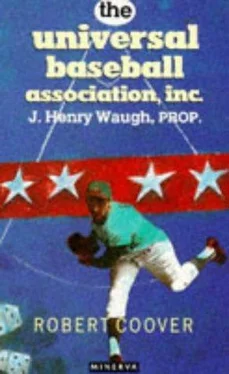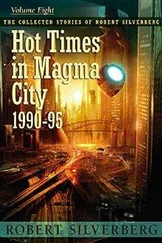Brock Rutherford II, who had failed in the UBA, was making it in the back booth of Mitch's, having gotten his pitching fist well under a sea-blue skirt. The mystic ship of life, sail on, sail on! Elsewhere, a black queen flew south, answered by a coalition of bishops. On a far wall, red-coated horsemen leaped hedges in pursuit of… of something, a fox maybe, just a dark blur on the canvas there; maybe it was poor Sycamore Flynn. The youngsters beneath the raging sea had themselves grown suddenly still, eyes locked, oblivious |o everything, hands chastely gripping napkins, lips meeting — Mr. Mitch Porter materialized: with his left, he ordered the youngsters out, while his right hand summoned the waitress with the bill. Down the aisle plowed her proud white breast, then back up again, outstrutting the young cock, who left doubled over his arrowing desire, face lit with shame and anticipation. Mr. Porter apparently didn't notice the navy officer who, while chatting amiably above table, had bared everything beneath. Matter of interpretation, no doubt. And why haven't you ever married, Henry? Who asked that? Lou? Henry glanced up, but Lou was ingesting neat brown slabs of duck, a jewel of orange rind glistening on his plump chin. It was really good, all right, had a wild original taste all its own, a genuine creation: Mitch Porter could play on anybody's team. Hall of Fame.
Now he passed with a bottle of rose on ice. With a whirling flourish of wrist and fingers, he conjured out the cork, poured a finger into each of their glasses. They tasted: "Mmm, good!" said Lou. "But—?"
"My pleasure," said Mr. Porter with a slight bow, and filled their glasses, then disappeared before they could really thank him.
"Gee, that was nice, wasn't it, Henry?"
"Mmm. Great duck, too."
"I told you."
The waitress pecked disparagingly in the gravel of small coins left her by the banished teen-agers, then click-click-clicked back up the aisle with dirty dishes, swishing her ample tail; the officer, still fishing, watched benignly. The gaze of his young prey, however, fell on Henry; she started, flushed, pushed the officer's hand out, then, feathers ruffled, pranced off to the ladies' room, the door of which, Henry noticed, was upholstered in the same cheap leatherette as the booths. Leftover piece. The officer, grinning, said something to the waitress. Jauntily, she arched her hips, peeked back over her shoulder at her apron strings, flicked one hand loose-wristed at the officer — he laughed aloud — and switched on back to the kitchen, marvelously pleased with herself.
Why? Maybe it was Hettie who asked. Or Mitch Porter, dropping by on the quarter hour to receive, solemnly, their homage. Or Mrs. Mitch, yawning cavernously over her movie magazine. Yes, young Brock was handsome, elegant in his way, but it was easy to see that in a real ball game he just didn't have it. Something vital missing. How would his son — Henry assumed it would be a boy — turn out? Grandpa's genes dominating probably, and that was okay, he'd need some of that raw power, hopefully a touch of his uncle's grace — and on the mother's side? Henry watched her emerge from the ladies' room, handbag clutched front and center. She fired one angry glance Henry's way, then homed for the officer; too much temper and a little baggy in the britches. Have to wait and see. Might be worth twenty more seasons just to find out. A man like Brock Jr., with nothing else to do, could marry; Henry couldn't. That was all. A family, beautiful wife tender and loving, children with their special hurts and happinesses: great comfort, great pleasure. But Henry had chosen the loner's life, the general pain, because… because… he couldn't help himself.
Aw, shee- it now! cracked old Pappy Rooney, bachelor himself but suitor of no pain, except that which served to prove to him he lived still. Some like it, some don't. Rooney pinched the lady's bottom for luck, drew a dark ace in the hole: That's it! he chortled, that's what they're for!
"Henry, if you don't mind my saying so, I, well, I've noticed you've been talking to yourself sort of lately sometimes…"
Henry gazed up at the plump perspiring face of his friend, now anointed with orange sauce. "I've been talking to myself all my life," he said, and crossed his knife and fork on the plate.
The waitress, clearing, stretched out over their table, hips outthrust, full breasts aquiver — wonderful how she did that, excessive but communicative, style all her own. Willie O'Leary tucked a toothpick in his teeth, and lifting his right hand in a benediction upon that bosom, said: "When he stretched forth his hand, the mountains trembled." And, reflexively, they did.
"Oh, you!" the waitress said, cuffing him gently with a damp hand, and O'Leary tweaked a rib. Abdomen muscles flexed, bouncing her back off the table; she grinned, flicked her tail to his view — there was an instant, just time for a pinch, but this was Mitch's, after all, not Jake's, and O'Leary's hand in motion abruptly stopped and its fingers snapped — the waitress flinched, good as the real thing, then giggling to herself, swished kitchenward with dishes.
"Why haven't you never got married, Henry?" Lou asked, cheeks brightly flushed from such proximity to license. Maybe it had been Lou asking all the time.
"I don't know, never thought about it much," Henry lied. "Probably the same reasons you didn't want to."
"Didn't want to!" After big meals, Lou's squeaky voice mellowed. A kind of coo. You could hardly hear it. Lou scrubbed his face with a napkin, pressed forward. "Henry, I'd get married tomorrow, if I knew where to start. You always know how to say the right thing, but me — Henry, I've never even gone, you know, on a, out with a.. " Yes, it was Holly Tibbett, all right, in the flushed and floundering flesh. Up from the ashes, a magical event.
"Shall we start then with the waitress?" O'Leary suggested. Willie was modestly but marvelously drunk, while back of the pillar, Gabe and Frosty and the boys were egging him on. They took Holly up to Molly… He signaled.
" No! " gasped Holly, looking for some place to run, but too full to squeeze out.
O'Leary saw the others splitting their sides, but with effort kept a straight face, which seeing, the approaching waitress grinned at broadly. In on it. In on everything. They took Holly up to Molly/And she said she'd like, by golly/To eat a hot tamale in the shower. . Willie O'Leary lit up one of Holly's cigars, and admiring a navel-high splotch of shrimp sauce on the white face of the moon, said: "Molly, my girl, what can we do, you and I, to relieve a poor lad in direst distress?"
"A lad…?" A little slow; she was.
"Yes, our friend here, the vice-president in charge of talent-testing for All-American Symphonies Consolidated; he's on the quest of a respectable and compassionate — and of course talented — lady companion to go, uh, round die world with him on an unlimited expense account, and who do you think we can find for him?" The brogue was a little rusty, but he saw she liked the music of it.
"Who, ya mean Mr. Engel here?" Molly said. "Ya must be kiddin'!" Slow as they come.
Henry grinned. "Sure, I'm kiddin'," he said. They all knew Holly wherever he went, too — the backside of shyness. O'Leary winked. "He's really the president."
She smiled, rubbing her nose with one hand, stroking her big round butt with the other, looked down on poor Lou, near to tears with shame and desire. Well, that tamale was a folly /For melancholy Holly/Cause that dolly stole his jolly little flower. . "Get me back in time for work Monday?" she asked.
Holly, the crimson flush congealing suddenly into brilliant splotches, giggled hopelessly. The boys, concealed, whooped it up.
"So, what'll it be, boss?" O'Leary asked, and blew smoke on the excited birds that fluttered around them. "Round the world or two lemon sherbets?"
Читать дальше












